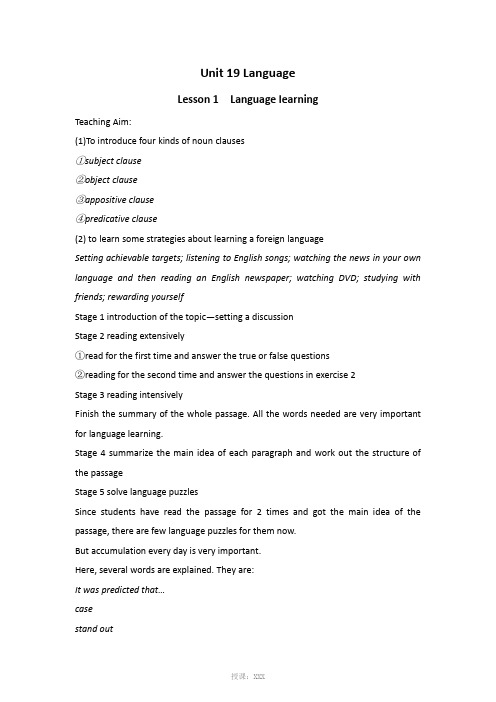北师大版英语选修7
- 格式:pdf
- 大小:1.56 MB
- 文档页数:30






Unit 19 LanguageLesson 1 Language learningTeaching Aim:(1)To introduce four kinds of noun clauses①subject clause②object clause③appositive clause④predicative clause(2) to learn some strategies about learning a foreign languageSetting achievable targets; listening to English songs; watching the news in your own language and then reading an English newspaper; watching DVD; studying with friends; rewarding yourselfStage 1 introduction of the topic—setting a discussionStage 2 reading extensively①read for the first time and answer the true or false questions②reading for the second time and answer the questions in exercise 2Stage 3 reading intensivelyFinish the summary of the whole passage. All the words needed are very important for language learning.Stage 4 summarize the main idea of each paragraph and work out the structure of the passageStage 5 solve language puzzlesSince students have read the passage for 2 times and got the main idea of the passage, there are few language puzzles for them now.But accumulation every day is very important.Here, several words are explained. They are:It was predicted that…casestand outthe chances that 句子are small.EncourageAnd teachers here can give them a task---to look for the usage of the following words in the dictionary.adjust and informStage 6 grammar focusTo learn noun clausesHomework: exercise 1,2,3,5,6 on page 52 and page 53 can be used as exercise resources.Unit 19 LanguageLesson 2 Varieties of EnglishTeaching Aims:1.To practice listening strategies for identifying different English accents2.To develop awareness of different English expressions in different countries.3.To practice using phrasal verbs.4.To discuss the different accents people have when speaking English.Teaching difficulties:1. To practice listening strategies for identifying different English accents2. To develop awareness of different English expressions in different countriesResources used: Cassette, ComputerTeaching procedures:Ⅰ. Warming upT: How many countries can you name where English is the native language? Do all these English speakers sound the same?S:T: English is widely used in the world, but for some reasons such as history, culture, costume and so on English is spoken differently in different countries more or less. Look at the key words.Match them to words with the samemeaning in the list below.Do the exercise 2 Student work in pairs matching the key words to the words with the same meaning in the list.Do the exercise 3 As a class, students discuss what makes the pairs of words different.Question: What do you think makes the Key Words different from the words in the list?Answer: The key words are British expressions, while the words below are American expressionⅡListen to learn1. Do the exercise 4Listen to the dialogue and decide if these statements are true (T) or false (F).Play the cassette once for students to decide if these statements are true or falseCheck answers as a class. Ask students to correct the false statements.If necessary, play the cassette again.2. Do the exercise 5As a class, discuss why Liang Weimin thought all English speakers sounded like BBC World Service reporters.Question: Why do you think Liang Weimin thought all English speakers sounded like BBC World Service reports?Answer: Liang Weimin didn’t know people have different English accents depending on where they come from3. Do the exercise 6Ask students to read the strategies to the class in order to understand the listening skill.Play the cassette twice for students to listen and decide whether they are spoken in an American accent or a British accent.Check answers as a class by playing the cassette again, pausing after each sentence, and having students repeat the pronunciation which is the clue to the accent.Question: Can you identify a rule for the difference in the American and British pronunciation of the sound /a:/.Play the cassette twice to let students identify a rule for the difference in the American and British pronunciation of the sound /a:/.Answer: British pronunciation of the sound /a:/ but in American English is pronounced / æ/ 5.Do the exercise 7Play the cassette twice for students to listen and decide whether they are spoken in an Australian accent or a British accent.By playing the cassette check the answer and ask students to tell the reason, and pausing after each sentence. And having students repeat the pronunciation which is the clue to the accent.Question: Can you identify a rule for the difference in the Australian and British pronunciation of the sound /ei/Play the cassette twice to let students identify a rule for the difference in the Australian and British pronunciation of the sound /ei/Answer: British pronunciation of the sound /ei/ but Australian pronounces as /ai /6.Do the exercise 8.Play the cassette once for students to listen and decide where the speakers come from.Play the cassette again and pause after each speaker for students to write down the words which have been pronounced differently with American, British or Australian accents.Check answer as a class and ask students to share rules they have noticed for the each country. ⅢListening1. Have individuals read out the listening strategies. Ask students if these strategies alsoapply when listening to Chinese.Do the exercise 9Listen to the Canadian travel dialogues. Use the Strategies to choose the correct alternative for each dialogue. There is one extra answer.Play the cassette twice for students to listen and answer the question2. When we speak English we must pay attention to expressing our idea indirectly and politelyand follow its custom and habit. Now let’s read through the Function File and see if they can match any of the expression with the gaps.Listen again and use these expressions to complete the Function File.3. Do the exercise 11Listen two or three times, pausing it for students to repeat the polite requestsⅣHomeworkWork in pairs. Student A and Student B turn to page 103Unit 19 LanguageLesson 2 The Varieties of EnglishTeaching objectives:1.To practice listening strategies for identifying different English accents.2.To develop awareness of different English expressions in different countries.3. Identify situations and peopleTeaching difficulties: Identify situations and peopleTeaching aids: ComputerTeaching Procedure:Step1 Warm up1.Discussion:1)How many countries can you name where English is the native language?2)Do all these speakers sound the same?2.Write down the words with the same meaning.1.mail_______2.movie______3.sidewalk_______4.trash _____5.Apartment_________ Step2 Listening1.Listen to the dialogue and decide if these sentences true (T) or false (F)1.Pam is American. ( )2.Robert comes from Australia. ( )3.The more different accents you hear the more confused you get.( )4.Richard has an Australian English accent.( )5.Pam and Robert say “classroom” the same way.( )2.SummaryListening strategiesIdentifying different English accents★Before listening, think about different English accents.★While listening, pay attention to words that pronounced in different English accents.★Listen to the intonation of the speakers to identify where they come from.★Try to identify rules for accent of each country or place.Step3 Practice1.Listen and decide whether they are spoken in an American accent (A) or British accent (B)1).Would you like a glass of water? ______2).She is dancing in the classroom.______3).Let’s give you an example._________4).I like to eat tomatoes._________2.Listen and decide whether they are spoken in an Australian accent (A) or British accent (B)1).Did you say you’re going sailing this weekend.___2).I’m going on a date this Saturday._____3).How much did you pay for your rollerblades.____4).The mail always comes on Tuesday._____5). What did you say when he was late._____6). Sorry I’m late. I had to pay my bills. ______3.Listen and decide which speaker is American, which is British and which is Australian.Step4.Listening Strategies★Identifying situations and people★alternatives in the questions--what are they going to talk about.★the important words ---identify the situation.★sound effects --identify the situation.★language formal or informal--what the relationships are between the people★the intonation --their moodsStep5.PracticeListen to the Canadian travel dialogues. Use the Strategies to choose alternative for each dialogue.1.Where are the people?A)in a tourist information office B)in a hotelC)at the observation dome D)at the travel agent’s2. Who is talking?A)a tourist and a trainee B)a receptionist and a hotel guestC)a passenger and the Tour Managers D)two passengers3.What are they talking about?A)a tour around the city B)a delayC)stopping off somewhere D)the city’s buildings4.How do the tourists feel?A)nervous B)frustrated C) happy D)tiredStep6 Function File--Polite requests1._______to fill in this form here, please.2.I know this is unusual, but after the long flight _________to go on with the group.3.__________I just go off on my own a bit later?4._________she won’t be here till about ten o’clock.5._________having lunch in the hotel, sir?6.__________give me a map of the city, please?7.__________you could give me information about visiting some of the buildings in Toronto, please?8.____________have something about the modern buildings, please?9._______ask someone else, please?10.______I could ask you something?11._______to stay over an extra night in Winnipeg?12._______we have to keep to the timetable, sir.Step7.Activities--Act out a dialogueStudent A—a tourist who is checking in a hotel, make some requests at the front desk.Student B—a receptionist of the hotel, refuse some of the requests politelyUnit 19 LanguageLesson 3 Body LanguageTeaching Aim:(1) to learn common sense of body language.(2) to learn to analyze the structure of the passage and accumulate some new words. Stage 1 warm-upTeachers here can give several pictures and some documents to show the topic of the passage.Stage 2 reading extensivelyread for the first time and match the paragraph with its titleStage 3 reading intensively①give some hints of each paragraph and work out the main idea of the passage.②True or False questionsStage 4 solve language puzzlesSince students have read the passage for 2 times and got the main idea of the passage, there are few language puzzles for them now.But accumulation every day is very important.Here, several words are explained. They are:consist of and be made up ofpurchasebe aware ofregardless ofAnd some exercises are offered to consolidate students’ memory.Stage 5 vocabulary accumulation and exerciseHomework: all the exercises on page 56 and page 57 can be used as exercise resources.Unit 19 LanguageCommunication Workshop---教案Teaching Aim:(1) to learn some formal sayings in a letter(2) to learn the usage of several linking words: as long as, except if, if, unless.Stage 1 warm-upRead an advertisement and get to know what the letter is about.Stage 2 correcting the mistakesAccording to the hints, students can correct the mistakes by themselves before teacher check the answers.Stage 3 linking words①look at the example and get the meaning of the linking words in the sentences.as long as:只要unless:如果…不…,其用法相当于if …not …②exercisesStage 4 writing a letterLearn the structure of the passage and students can refer to Writing help on page 97. Students can imitate the structure and write a letter.Homework: exercise on page 60 and page 61 can be used as exercise resources.Unit 20 New FrontiersLesson 1 Futurology一、课标分析根据《高中课程标准》的规定,在高二的学习中,学生要发展自己的英语语言运用能力:用英语进行恰当交流的能力;用英语获取信息、处理信息的能力。
Unit 21 Lesson 1 Chewing gumWarm-upTeaching aims1.new words and phrases2.warm-up3.study the text: To chew or not to chew…4.grammar: conditionalsTeaching timeTwo periodsTeaching processStep 1 Revision:1.have a dictation (unit 20 new words)2.check homework exercisesStep 2 new words learning1.ask some students to read the new words first and correct their pronunciation2.play the tape and have them read after the tape3.give them a few minutes to read the new word s freely ,tell them if they can’t read the new words, encourage them to ask the teacher .Step 3 Warm-up1.Read unit objectives, and ask the students to tell us the meanings.2.warm-up :Exercise 1a)ask students read the key words first, then guess their meanings, have them translate the key words into Chinese.b)students work individually, matching six of the key words with the numbers in the picture.Then, check their answers.c)ask them read the key words.3.Exercise 2a)listen to the tape twice, have students guess which part of the body are beingdescribed.b)play the cassette ,pausing after each section to check their answers.C )answers:1.brain 2.heart 3.hungs 4.eye 5.liver4.Exercise 3a)make sure the class know what to do. Then play the tape twice, ask some students to say their answers to the class.5.Exercise 4:work in pairs and test your body “machine”a)read out the instructions to the class and check that students understand them.b)have the students work in pairs and discuss the questions.6.exercise 4:give students a few minutes to do the questionnaire in pairs.Then check their scores on page 103.step 4 Reading1.Before you starta) read the exercise 1 and give them a few minutes to discuss the questionsb)ask some students to share their ideas with the class.2.Read to learna)ask the students look at exercise 2 and 3, and then play the cassette twice.b)give them ten minutes to read the text and complete the table.c)check theirs answers3.exercise 4a)give students some time to do the exercises in pairsb)ask some students to answer the questionsnguage pointsa)Diet specialists regularly inform us that it is important to chew our food properly.营养学家们经常告诫我们一定要正确咀嚼食物。
2024-2025学年北师大新版选修7英语上册阶段测试试卷332考试试卷考试范围:全部知识点;考试时间:120分钟学校:______ 姓名:______ 班级:______ 考号:______总分栏一、选择题(共1题,共2分)1、This book gives a brief _____ of the history of the castle and details of the art collection in the main hall.A. outlineB. referenceC. articleD. outlook二、根据汉语意思填写单词(共1题,共2分)2、See, your computer has broken down again! It doesn’t make sense to buy the cheapest ________ (品牌) of computer just to save a few dollars. (根据汉语提示单词拼写)三、用单词的适当形式完成(共1题,共2分)3、Just LoveMy story is about receiving unconditional love from my students.With so much going against immigrants, I want to share this story that blessed an immigrant like me.I teach nursing here in the US. I am from China, and I just 【小题1】start) working in a community college in California in July 2016. At the beginning, I was 【小题2】(worry) that I couldn’t make myself 【小题3】(understand) by my students as my accent was different. I thought I would never be accepted. My thoughts were 【小题4】(complete)wrong! Each day they encouraged me 【小题5】(get) better. They never discourage me.As weeks passed, my students came up with an idea to encourage this foreign teacher of 【小题6】(they). They gave me a prize for getting better with my 【小题7】(pronounce). I was given a packet of Skittles(彩虹糖), 【小题8】truly moved my heart. I am so thankful to my students. It’s not that I teach them nursing, but that they teach me life. I am glad to be 【小题9】teacher to these hard-working students who try hard to be wonderful future nurses.I just want to encourage anyone feeling depressed. Never give 【小题10】. There is always hope.参考答案一、选择题(共1题,共2分)1、A【分析】【详解】考查名词词义辨析。
Unit 19 LanguageLesson 1 Language learningTeaching Aim:(1)To introduce four kinds of noun clauses①subject clause②object clause③appositive clause④predicative clause(2) to learn some strategies about learning a foreign languageSetting achievable targets; listening to English songs; watching the news in your own language and then reading an English newspaper; watching DVD; studying with friends; rewarding yourselfStage 1 introduction of the topic—setting a discussionStage 2 reading extensively①read for the first time and answer the true or false questions②reading for the second time and answer the questions in exercise 2Stage 3 reading intensivelyFinish the summary of the whole passage. All the words needed are very important for language learning.Stage 4 summarize the main idea of each paragraph and work out the structure of the passageStage 5 solve language puzzlesSince students have read the passage for 2 times and got the main idea of the passage, there are few language puzzles for them now.But accumulation every day is very important.Here, several words are explained. They are:It was predicted that…casestand outthe chances that 句子are small.EncourageAnd teachers here can give them a task---to look for the usage of the following words in the dictionary.adjust and informStage 6 grammar focusTo learn noun clausesHomework: exercise 1,2,3,5,6 on page 52 and page 53 can be used as exercise resources.Unit 19 LanguageLesson 2 Varieties of EnglishTeaching Aims:1. To practice listening strategies for identifying different English accents2. To develop awareness of different English expressions in different countries.3. To practice using phrasal verbs.4. To discuss the different accents people have when speaking English.Teaching difficulties:1. To practice listening strategies for identifying different English accents2. To develop awareness of different English expressions in different countriesResources used: Cassette, ComputerTeaching procedures:Ⅰ. Warming upT: How many countries can you name where English is the native language? Do all these English speakers sound the same?S:T: English is widely used in the world, but for some reasons such as history, culture, costume and so on English is spoken differently in different countries more or less. Look at the key words.Match them to words with the same meaning in the list below.Do the exercise 2 Student work in pairs matching the key words to the words with the same meaning in the list.Do the exercise 3 As a class, students discuss what makes the pairs of words different. Question: What do you think makes the Key Words different from the words in the list? Answer: The key words are British expressions, while the words below are American expressionⅡListen to learn1. Do the exercise 4Listen to the dialogue and decide if these statements are true (T) or false (F).Play the cassette once for students to decide if these statements are true or falseCheck answers as a class. Ask students to correct the false statements.If necessary, play the cassette again.2. Do the exercise 5As a class, discuss why Liang Weimin thought all English speakers sounded like BBC World Service reporters.Question: Why do you think Liang Weimin thought all English speakers sounded like BBC World Service reports?Answer: Liang Weimin didn’t know people have different English accents depending on where they come from3. Do the exercise 6Ask students to read the strategies to the class in order to understand the listening skill.Play the cassette twice for students to listen and decide whether they are spoken in an American accent or a British accent.Check answers as a class by playing the cassette again, pausing after each sentence, and having students repeat the pronunciation which is the clue to the accent.Question: Can you identify a rule for the difference in the American and British pronunciation of the sound /a:/.Play the cassette twice to let students identify a rule for the difference in the American and British pronunciation of the sound /a:/.Answer: British pronunciation of the sound /a:/ but in American English is pronounced / æ/ 5. Do the exercise 7Play the cassette twice for students to listen and decide whether they are spoken in an Australian accent or a British accent.By playing the cassette check the answer and ask students to tell the reason, and pausing after each sentence. And having students repeat the pronunciation which is the clue to the accent.Question: Can you identify a rule for the difference in the Australian and British pronunciation of the sound /ei/Play the cassette twice to let students identify a rule for the difference in the Australian and British pronunciation of the sound /ei/Answer: British pronunciation of the sound /ei/ but Australian pronounces as /ai /6. Do the exercise 8.Play the cassette once for students to listen and decide where the speakers come from.Play the cassette again and pause after each speaker for students to write down the words which have been pronounced differently with American, British or Australian accents.Check answer as a class and ask students to share rules they have noticed for the each country. ⅢListening1. Have individuals read out the listening strategies. Ask students if these strategies alsoapply when listening to Chinese.Do the exercise 9Listen to the Canadian travel dialogues. Use the Strategies to choose the correct alternative for each dialogue. There is one extra answer.Play the cassette twice for students to listen and answer the question2. When we speak English we must pay attention to expressing our idea indirectly and politelyand follow its custom and habit. Now let’s read through the Function File and see if they can match any of the expression with the gaps.Listen again and use these expressions to complete the Function File.3. Do the exercise 11Listen two or three times, pausing it for students to repeat the polite requestsⅣHomeworkWork in pairs. Student A and Student B turn to page 103Unit 19 LanguageLesson 2 The Varieties of EnglishTeaching objectives:1.To practice listening strategies for identifying different English accents.2.To develop awareness of different English expressions in different countries.3. Identify situations and peopleTeaching difficulties: Identify situations and peopleTeaching aids: ComputerTeaching Procedure:Step1 Warm up1.Discussion:1)How many countries can you name where English is the native language?2)Do all these speakers sound the same?2.Write down the words with the same meaning.1.mail_______2.movie______3.sidewalk_______4.trash _____5.Apartment_________ Step2 Listening1.Listen to the dialogue and decide if these sentences true (T) or false (F)1.Pam is American. ( )2.Robert comes from Australia. ( )3.The more different accents you hear the more confused you get.( )4.Richard has an Australian English accent.( )5.Pam and Robert say “classroom” the same way.( )2.SummaryListening strategiesIdentifying different English accents★Before listening, think about different English accents.★While listening, pay attention to words that pronounced in different English accents.★Listen to the intonation of the speakers to identify where they come from.★Try to identify rules for accent of each country or place.Step3 Practice1. Listen and decide whether they are spoken in an American accent (A) or British accent (B)1).Would you like a glass of water? ______2).She is dancing in the classroom.______3).Let’s give you an example._________4).I like to eat tomatoes._________2.Listen and decide whether they are spoken in an Australian accent (A) or British accent (B)1).Did you say you’re going sailing this weekend.___2).I’m going on a date this Saturday._____3).How much did you pay for your rollerblades.____4).The mail always comes on Tuesday._____5). What did you say when he was late._____6). Sorry I’m late. I had to pay my bills. ______3.Listen and decide which speaker is American, which is British and which is Australian.American Australian BritishJanPattieShaneStep4.Listening Strategies★Identifying situations and people★alternatives in the questions--what are they going to talk about.★the important words ---identify the situation.★sound effects --identify the situation.★language formal or informal--what the relationships are between the people★the intonation --their moodsStep5.PracticeListen to the Canadian travel dialogues. Use the Strategies to choose alternative for each dialogue.1.Where are the people?A)in a tourist information office B)in a hotelC)at the observation dome D)at the travel agent’s2. Who is talking?A)a tourist and a trainee B)a receptionist and a hotel guestC)a passenger and the Tour Managers D)two passengers3.What are they talking about?A)a tour around the city B)a delayC)stopping off somewhere D)the city’s buildings4.How do the tourists feel?A)nervous B)frustrated C) happy D)tiredStep6 Function File--Polite requests1._______to fill in this form here, please.2.I know this is unusual, but after the long flight _________to go on with the group.3.__________I just go off on my own a bit later?4._________she won’t be here till about ten o’clock.5._________having lunch in the hotel, sir?6.__________give me a map of the city, please?7.__________you could give me information about visiting some of the buildings in Toronto, please?8.____________have something about the modern buildings, please?9._______ask someone else, please?10.______I could ask you something?11._______to stay over an extra night in Winnipeg?12._______we have to keep to the timetable, sir.Step7.Activities--Act out a dialogueStudent A—a tourist who is checking in a hotel, make some requests at the front desk.Student B—a receptionist of the hotel, refuse some of the requests politelyUnit 19 LanguageLesson 3 Body LanguageTeaching Aim:(1) to learn common sense of body language.(2) to learn to analyze the structure of the passage and accumulate some new words.Stage 1 warm-upTeachers here can give several pictures and some documents to show the topic of the passage.Stage 2 reading extensively①read for the first time and match the paragraph with its titleStage 3 reading intensively①give some hints of each paragraph and work out the main idea of the passage.②True or False questionsStage 4 solve language puzzlesSince students have read the passage for 2 times and got the main idea of the passage, there are few language puzzles for them now.But accumulation every day is very important.Here, several words are explained. They are:consist of and be made up ofpurchasebe aware ofregardless ofAnd some exercises are offered to consolidate students’ memory.Stage 5 vocabulary accumulation and exerciseHomework: all the exercises on page 56 and page 57 can be used as exercise resources.Unit 19 LanguageCommunication Workshop---教案Teaching Aim:(1) to learn some formal sayings in a letter(2) to learn the usage of several linking words: as long as, except if, if, unless.Stage 1 warm-upRead an advertisement and get to know what the letter is about.Stage 2 correcting the mistakesAccording to the hints, students can correct the mistakes by themselves before teacher check the answers.Stage 3 linking words①look at the example and get the meaning of the linking words in the sentences. as long as:只要unless:如果…不…,其用法相当于if …not …②exercisesStage 4 writing a letterLearn the structure of the passage and students can refer to Writing help on page 97.Students can imitate the structure and write a letter.Homework: exercise on page 60 and page 61 can be used as exercise resources.Unit 20 New FrontiersLesson 1 Futurology一、课标分析根据《高中课程标准》的规定,在高二的学习中,学生要发展自己的英语语言运用能力:用英语进行恰当交流的能力;用英语获取信息、处理信息的能力。